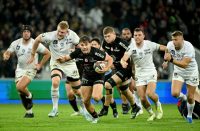 The 19th Heineken Cup has been billed as the last of its kind, the collector’s edition. And winning it will be a huge accolade irrespective of what comes next. That is because, whether it is eventually supplanted by the Anglo-French cross-border cup bouncing around European rugby’s boardrooms – which could either have multiple participants, including South African, or none at all – the old tournament has one credential on which most people can agree.
The 19th Heineken Cup has been billed as the last of its kind, the collector’s edition. And winning it will be a huge accolade irrespective of what comes next. That is because, whether it is eventually supplanted by the Anglo-French cross-border cup bouncing around European rugby’s boardrooms – which could either have multiple participants, including South African, or none at all – the old tournament has one credential on which most people can agree.
Namely, that the vast majority of the clubs, or provinces, that won the Heineken Cup deserved the title “Champions of Europe”. The kudos was hard-earned, and many of the finals were superb contests. My pick of the bunch were Leicester’s 34-30 win over Stade Francais in Paris in 2001, the Wasps 27-20 victory over Toulouse at Twickenham in 2004, and Leinster‘s unstoppable 33-22 comeback against Northampton in 2011.
As we contemplate the 19th tournament there is a symmetry about the champion teams. It has been won six times each by teams from England, France and Ireland, and has never been won by a team from Wales, Scotland or Italy.
For what it is worth, in terms of the current dispute, the Anglo-French pact between the Premiership and Top 14 has produced twice as many tournament winners as the Celtic-Italian alliance in the Pro12.
Given the spending power and strength of the squads available to leading Top 14 clubs – with star players like Bryan Habana and Jonny Sexton cherry-picked from every rugby nation – the French have to be favourites to add another winner to their roster when the final is played at the Millennium Stadium in Cardiff on Saturday, May 24.
Whether it is the reigning champions, Toulon (Pool 2), who, with Jonny Wilkinson as the centrifugal force, finally justified the huge sums of money pumped into the club by winning in Dublin four months ago, or the beaten finalists, Clermont Auvergne (Pool 4), the French will be difficult to dispossess.
Add the French champions, Castres (Pool 1), Toulouse (Pool 3), Racing Metro (Pool 4), Montpellier (Pool 5) and Perpignan (Pool 6) to the pot and you have a tasty coq-au-vin simmering away.
The strength of the clubs in the upper reaches of the Top 14 means the French have serious quarter-final contenders in five of the six pools. Only Perpignan appear short of the firepower required to make the last eight.
By comparison, most of the English clubs lack the star quality and depth to reverse a trend which has not seen a Premiership winner since Wasps in 2007. The possible exceptions to that rule are Saracens, Leicester and Northampton.

Last season’s semi-finalists, Saracens (Pool 3), now have a depth to rival the leading French clubs. However, in the last campaign their backs, while solid, did not have the electricity required to shock the main contenders. Little has changed.
On the plus side, their back row contains two of the most high voltage flankers in the tournament in the rugged Namibian, Jacques Burger, and the young English openside, Will Fraser. Add to that the poundage and power of the two Vunipolas, Mako and Billy, and tighthead James Johnston, and they will take some shifting.
Leicester (Pool 5) are also two deep in every position, and the spine of the team is stiffened by the presence of their 2013 Lions, Tom and Ben Youngs, Geoff Parling, and Dan Cole. However, Tom Croft’s pace and lineout versatility will be missed, and there is also a surprising lack of cover at tighthead, where they could be troubled should Cole take a knock.
Another hitch is the unavailability, initially, of Manu Tuilagi. However, it is a perilous business to underestimate the Tigers‘ outside backs, as Adam Thompstone, Vereniki Goneva, and Niall Morris have demonstrated on multiple occasions.
Northampton (Pool 1) do not yet have the degree of cover that Leicester and Saracens enjoy, but, when it comes to backline strike power, they have big missiles to fire. George North is the most destructive of these in attack, but the advance of Luther Burrell, the muscularity of George Pisi, the elusiveness of Jamie Elliott, and the flair of Ben Foden, gives them a host of options.
The Saints also have a greater search and destroy capacity than most English clubs. No one in the Premiership does offensive defence like Courtney Lawes and Samu Manoa, and, with the likes of Tom Wood, Phil Dowson and Alex Corbisiero there to hoover up the turn-overs, they are not likely to be easy prey in the ‘Pool of Death’.
Outside that trio, Gloucester (Pool 6) have the backs to make progress but not the front five forwards, Harlequins (Pool 4) are in the same boat, and Exeter (Pool 2) have a good mix, but not an exceptional one. How far Exeter go will depend on their pack going up a gear, and their giant game-breaker, Sireli Naqelevuki, returning fit and firing to their midfield after a knee injury.

Of the Pro12 sides the three evergreen Irish contenders, Leinster, Munster and Ulster, have prepared by following the well-worn path of resting most of their international stars for the first month of the season.
The semi-competitive nature of the Pro12, with no promotion or relegation, and 11 of the 12 sides in the league guaranteed Heineken Cup qualification, allows the Celtic and Italian teams this luxury.
No one maximises on the advantage better than the Irish, who have made an art of peaking when it counts in this tournament. Three-time winners Leinster (Pool 1) have undergone the biggest close-season transformation with Joe Schmidt, their Kiwi mastermind, moving to the Ireland job, and former Tigers head coach, Matt O’Connor, stepping in.
While Leinster are perhaps not the force they were two seasons ago, there will be no lack of motivation with the veteran Brian O’Driscoll and captain Jamie Heaslip both with axes to grind after the Lions tour.
Predictably, Leinster, Munster, and Ulster all raised their game a fortnight before the Heineken Cup opening round, winning their Pro12 games comfortably after reintroducing their star turns. Paul O’Connell came off the bench for Munster in their 23-9 victory over the Dragons, Tommy Bowe starred in Ulster’s 32-13 rout of Treviso, and O’Driscoll turned back the years in Leinster’s 34-20 win over Cardiff in front of 17,000 fans at the RDS.
Nevertheless, this time the Irish provinces did not go into the competition as Pro12 pacesetters. That honour has been claimed by Glasgow, unbeaten after the fourth round, as were the second-placed Ospreys.
These sides are the last chance saloon for Scottish or Welsh hopes of toasting one of their own as champions of Europe under the Heineken Cup format. Glasgow (Pool 2) will be an awkward proposition, but it is the Ospreys who have the best chance of breaking the English, French and Irish monopoly.
With a triumphant Welsh Lions contingent of Richard Hibbard, Adam Jones, Ian Evans, Alun Wyn Jones, and Justin Tipuric, the Ospreys should have the forward might to survive the group of death. Do that, and another Welsh red letter day cannot be ruled out.
However, the Ospreys will have to get past the French big spenders, as well as Leinster, Saracens, Munster and Leicester first. The collector’s edition is up for grabs.
3 Comments
Leave a Comment
You must be logged in to post a comment.























“Of the Pro12 sides the three evergreen Irish contenders, Leinster, Munster and Ulster, have prepared by following the well-worn path of resting most of their international stars for the first month of the season.
The semi-competitive nature of the Pro12, with no promotion or relegation, and 11 of the 12 sides in the league guaranteed Heineken Cup qualification, allows the Celtic and Italian teams this luxury.”
For goodness sake, just give a balanced pre-view of the tournament without taking the opportunity to take pot shots at someone else’s system just because it is different. Ignorance plain and simple (and factually incorrect, but don’t let that get in the way of printing eh!)
Totally agree with AnotherUlsterStu, 11 of the 12 sides are not guaranteed qualification, also if you check the team sheets of the big 3 Irish sides the week before the HC they all named pretty much full strength teams, English Premiership Clubs have their own return to action procedures and rest players at different times of the year. Never mind the French attitude of having a rest week every time your team goes away from home!
If you really want to be taken seriously as a credible rugby news site then some objectivity and balance is required, and if that is not possible at least ensure your reports contain the actual facts, if I wanted fiction I would buy a novel.
Pingback: Recommended Reading